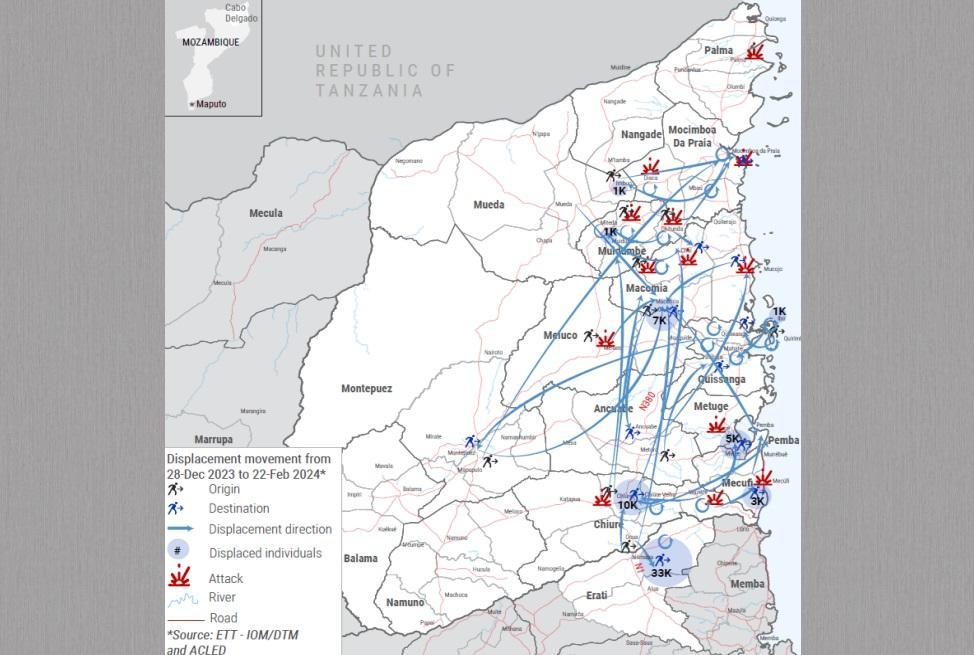Africa-Press – Mozambique. In December, confrontations between non-State armed groups (NSAGs) and the Security Defence Forces scaled-up, violent attacks against civilians occurred. NSAGs areas of operation have extended beyond Macomia, Mocimboa da Praia and Muidumbe. Starting in February, NSAGs southwards to Quissanga, Metuge, Mecufi and Chiure.
Civilians have been affected, with many being displaced – including people who had returned home – as a result of attacks and fear of attacks by NSAGs. People have been displaced in 12 of 17 districts in Cabo Delgado. The most recent estimates of people displaced IOM/DTM Emergency Tracking Tool of 26 February) indicate that since 22 December 71,681 people had been displaced, the majority are children (35,500) and women (14,500) representing 69 per cent of all people displaced. Since December, people have been fleeing the coastal areas (Mucojo) and northern areas (Chai) to Macomia district headquarters as a result of attacks, military activity and fear of attacks.
People fled within Chiure and towards Namapa and Alua in Erati district in Nampula province following attacks in Mazeze, Chiure Velho and Ocua in Chiure district in February. More than 15,000 people have fled to Chiure headquarters with another 33,234 people who have arrived in Erati district in Nampula province. Displacement from Cabo Delgado to Nampula had not occurred since 2022.
The latest spate of violence has occurred against a background of returns (601,866 people as of January 2024). A total of 540,000 people remain displaced in Cabo Delgado, with the highest number in Pemba City, Metuge and Macomia.
Humanitarian partners are concerned about the further spread of cholera in transit and accommodation sites. Currently, cholera outbreak is ongoing in three provinces (Cabo Delgado, Niassa and Nampula), with 13 active districts (Montepuez, Chiure, Ancuabe, Namuno, Metuge in Cabo Delgado province; Nampula City, Mecuburi, Meconta, Nacaroa, Erati in Nampula province; and, Lichinga, Majune and Chimbonila in Niassa province). As of 22 February, 22,117 cases of cholera with 27 deaths were reported countrywide, since October 2023.
Access overview
Road access to Macomia has been conditioned by insecurity and heavy rains which have damaged infrastructure but is possible. Along road N380, the Montepuez bridge is passable by four-wheel drive only and the Mingalewa bridge is transitable via a bypass. This is impacting the movement of trucks delaying the supply of carrying humanitarian commodities along to Macomia, Muidumbe, Mueda and Mocimboa da Praia along theN380.
Access on R762 (Metuge-Quissanga) is conditioned by poor road conditions due to heavy rains and insecurity.
The road between ADPP (N380) and Bilibiza, is in poor condition due to heavy rains. Humanitarian programmes in Quissanga have been disrupted because of insecurity and the poor state of the roads. Sea access is being considered.
There is movement of people and vehicles along the main roads in Chiure. The N1 road between Chiure and Nampula remains open. The bridge between Chiure district headquarters and Chiure Velho collapsed due to rain and is limiting movement.
Humanitarian response
According to the latest mapping of humanitarian stock available, dated 31 January 2024, the following supplies
were available in country:
Given ongoing response, the stocks are fast diminishing. At the moment, there are 2,000 kits of food stock available to assist 10,000 people for two weeks. A shelter pipeline breakdown is expected by the end of March.
Nampula
Erati:
IOM/DTM reports 33,218 people displaced in Erati as of 24 February. There are IDPs who have not been registered.
The majority of the displaced are reported to be in Namapa in two locations: Namapa Sede and Alua. Namapa Sede hosts the largest number in two schools and host community.
A joint government-cluster assessment team, including local organizations and national NGOS, were in Erati on 24 and 25 February. Food, Shelter/NFIs, health, water, sanitation and hygiene, protection, education and Camp Coordination and Camp Management (CCCM), mental health and psychosocial support (MHPSS) are priority needs.
A three-day ration for 19,000 people was provided by INGD on 23 and 24 February. WFP started food distribution on 25 February aiming to cover 33,000 people with a food ration (cereals, pulses, and oil) for seven days. UNICEF is working with local authorities to start the implementation of WASH activities, including the construction of latrine in the transit site and water trucking for the three registration point in Namapa.
Authorities are considering the establishment of an accommodation centre in Namapa, significant investments will be needed in shelter, WASH, health, and protection.
The Shelter Cluster is coordinating with partners to implement NFI distributions in Erati. Partner capacities to support Erati displacements will depend on partners being able to pool in stock to complement each other’s kits. Shelter Cluster has commitments from CARE, UNHCR and the Emergency Shelter and NFI pipeline to assist displaced households in Erati.
Cabo Delgado
Chiure:
Some 54,534 individuals were displaced between 10 and 22 February 2024 as a result of attacks and the fear of attacks by NSAGS in Ocua, Mazeze, Chiure Velho posto (Chirue district).
The affected families have sought refuge in displacement sites and host communities in Chiure, Metuge and Erati. A total of 10,900 people are in seven sites within Chiure (Maningane, Muajaja, Kuphe, Namitua, Nahavara, Meriha, and Namisir).There is lack of WASH facilities, open defecation is prevalent and there is no segregation of bathrooms and toilets.
In Namariri, some IDPs are spending nights in the open.
Health provision has been affected by the destruction of health facilities and flight of health staff. IDPs who lost civil documents are detained at check points.
Through its partner, IOM, the CCCM cluster has mapped the empty shelters that were subsequently allocated to displaced families in sites such as Meculane, Megurumma, Nacivare. The CCCM cluster continues to monitor services at these sites and remains in close coordination with local authorities.
The JRP mechanism and WASH cluster in coordination with local authorities, Save the Children, ADRA, and Helvetas are supporting an estimated 10,995 IDPs.
On 23 and 24 February, an estimated 4,815 people received food, tarps, NFIs and hygiene kits (Namiuta: 313 HHs, Namisir: 172 HHs, Kuphe: 68 HHs, Meculane: 350 HHs, Nacivara: 60 HHs). Each distribution team includes a child protection focal point from SCI, who ensures the identification of vulnerable cases and prioritizes them during the distributions. These cases will be followed up by SCI for a second-line response starting next week. CARE and MENTOR will guarantee hygiene promotion sessions with special focus on cholera. During the activity, there will be a distribution of soaps (and possibly certeza) to host families that did not benefit from JRP kits.
IOM’s DTM teams, with support from Save the Children and in close coordination with SDPI, INGD, and the District Administrator, have been registering displaced families across neighborhoods in Chiure sede.
Macomia:
Some 2,626 individuals have been displaced between 8 and 22 February 2024 as a result of attacks and the fear of attacks by NSAGs in Macomia district (Mucojo, Pagane, and Chai).
The affected families have sought refuge in displacement sites and host communities in Macomia Sede, Ibo (Ibo Sede, Quirimba), and Pemba Cidade (Natite).
Within displacement sites, 1,144 individuals have been recorded in Xinavane, Nanga A, and Nanga B Centres. CCCM cluster has completed service mapping in displacement sites Xinavabe, Nanga A, Nanga B, Nanoa and Cordoso transit site in Macomia.
Additionally, an estimated 98 families (358 individuals) have arrived on Ibo Island, while 149 families (443 individuals) have arrived on Quirimba with intentions to stay with host communities in the coming weeks.
Families received in the Natite neighbourhood in Pemba plan to stay with host families in the immediate future.
Urgent assistance required includes; Shelter/NFIs; WASH; Health; Protection (safe space for women and girls, MHPSS, civil documentation); education for out-of-school children.
Increase in UNHAS flights and fuel supply to Macomia sede is urgently required.
As of 23 February, 24,865 individuals (4,973 HH) have received food assistance in Macomia sede.
The general food distribution includes newly displaced people. This is in addition to the emergency food assistance provided to around 2,500 new arrivals (500 HHS) at the end of January. ACF through the RRM consortium and with support from the Emergency Shelter and NFI pipeline has supported 573 households.
Metuge:
There are approximately 3,600 HH (18,000 people) from Chiure who fled to four displacement sites in. Some 400 IDPs are staying at Ntocota IDP site and 2,350 are with the community of Mpire in Mieza posto.
RRM is organising cash transfer using mobile phones to 400 IDPs in Ntocota, with the cash assistance amounting MZN 6,600 (U$ 103) to be provided to each family by 27 February.
Registration of the households in Mpire host community is ongoing.
For More News And Analysis About Mozambique Follow Africa-Press






